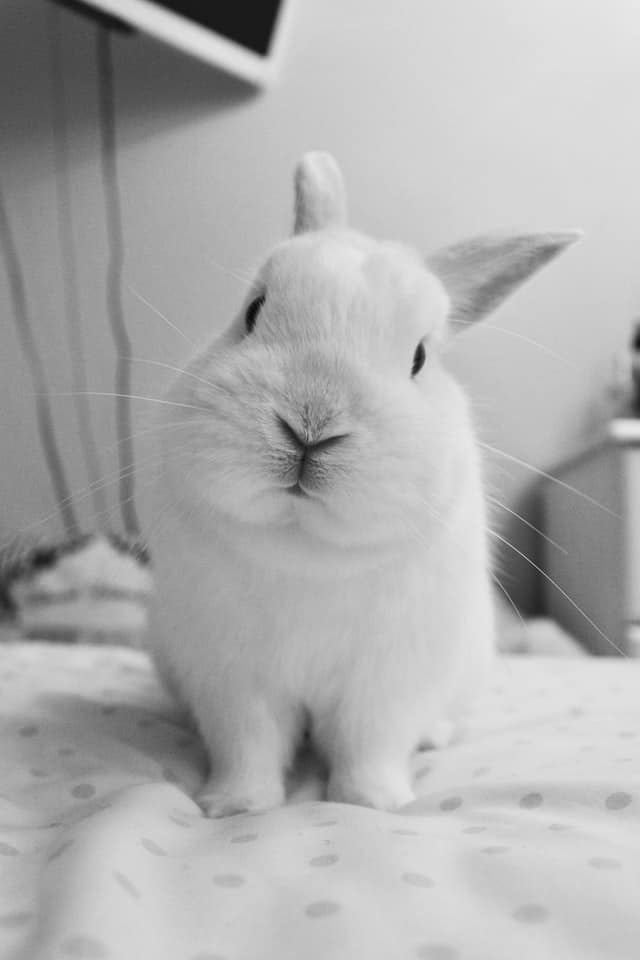
The Encephalitozoon cuniculi in rabbits intracellular parasite is a type protozoan that causes encephalitozoonosis, a common disease common in rabbits dwarf breeds. This disease leaves bunnies with a crooked head.
What is Encephalitozoon cuniculi in rabbits?
Encephalitozoon cuniculi is an obligate intracellular microorganism belonging to the Microsporidia phylum. This parasite affects animals such as mice, rabbits, monkeys, dogs, rats, birds, guinea pigs, and other mammals, including people.
It is a parasite that enters cells and reproduces until they burst, causing inflammation in the affected organs.
How is Encephalitozoon cuniculi spread in rabbits?
Rabbits become infected by ingestion or inhalation (less common) of spores from the urine of an infected rabbit. Transmission generally occurs by urine-oral contact, but it can also be transmitted to the offspring by the transplacental route.
There are many rabbits that have this parasite in their body and are not sick. The problems begin when this parasite leaves the stomach and manages to reach the head.
What are the symptoms of this disease?
The disease has different manifestations, especially neurological; head tilt is very common. It is thought that around 50% of domestic rabbits in Spain could be positive, but their immune system manages to control the parasite. In these cases, the rabbit is asymptomatic.
Kidney:
The parasite spores appear in the kidney 31 days after inoculation and are excreted in the urine up to 3 months later. Infections cause lesions that can remain asymptomatic for years.
Neurological signs :
When we find neurological signs we can observe, in addition to the tilted head: decay, difficulty coordinating movements, lack of balance, paralysis in the hind legs and, in some cases, complete paralysis. Involuntary and uncontrollable eye movement and behaviour changes can also occur.
Ocular:
Ocular encephalitozoonosis is generally seen in young rabbits. Inflammatory cells such as granulocytes, macrophages, and giant cells infiltrate the lens. The lens capsule can rupture over time, causing phacoclastic uveitis, and presents as a white mass inside the eye.
This disease has a treatment, but it is important that you contact your exotic veterinarian when any of these symptoms are detected, to treat it and avoid the secondary injuries that it produces in the organs as soon as possible.
Can Encephalitozoon be cured?
This disease usually remits with specific treatment prescribed by a veterinarian. If we detect the disease at an advanced level, it is possible that our bunny will have sequelae.
How to prevent?
To prevent the contagion of a rabbit that is negative, it should be known that, when combining it with positive rabbits, there is the possibility of contagion.
Contaminated food can also be sources of contagion, so it is always recommended to maintain maximum hygiene and care in the environment of rabbits, as well as in hay storage places . Wild vegetables or plants that are always offered to rabbits should be washed. The spores can live in the environment for weeks, so disinfection is very important.
Treatment of Encephalitozoon cuniculi in rabbits
To control the disease, a symptomatic treatment is used to attack the spores and avoid immunosuppression. The drug chosen by preference is Fenbendazole, an effective antiparasitic that is used to stop the infection and also as a preventive method in asymptomatic rabbits. In addition, it also prevents contagion. Remember that this medication must be prescribed by your exotic vet.
Treatment does not kill the parasite or cure the disease, but it prevents it from duplicating in cells and slows its growth, causing it to go dormant. The symptoms of a rabbit that has been sick can disappear completely or partially, as sometimes sequelae remain.
Is E. cuniculi dangerous for people?
No infection has been detected in people with pets, so it is not dangerous .
In the rare case of infection, the immune system eliminates the parasites naturally, causing mild and harmless symptoms that disappear easily, even without treatment. It is for this reason that Encephalitozoon cuniculi is dangerous for animals or immunosuppressive people, since their immune system is not capable of fighting infections as a healthy one would.
People and animals with a strong immune system do not become infected with the parasite or get sick, so it does not pose any risk to their health.
Diagnosis of E. cuniculi in rabbits
Diagnosis in live rabbits is made with a combination of physical examination (including neurological examination), serology, and ruling out other diagnoses. The most widely used serological test is the detection of IgG antibodies. However, a positive result of this test only indicates that the rabbit has been in contact with the parasite, it does not imply that the disease is going to develop or is developing.
As with humans, rabbits can adapt to living with a disability when they have the care and love they need.






